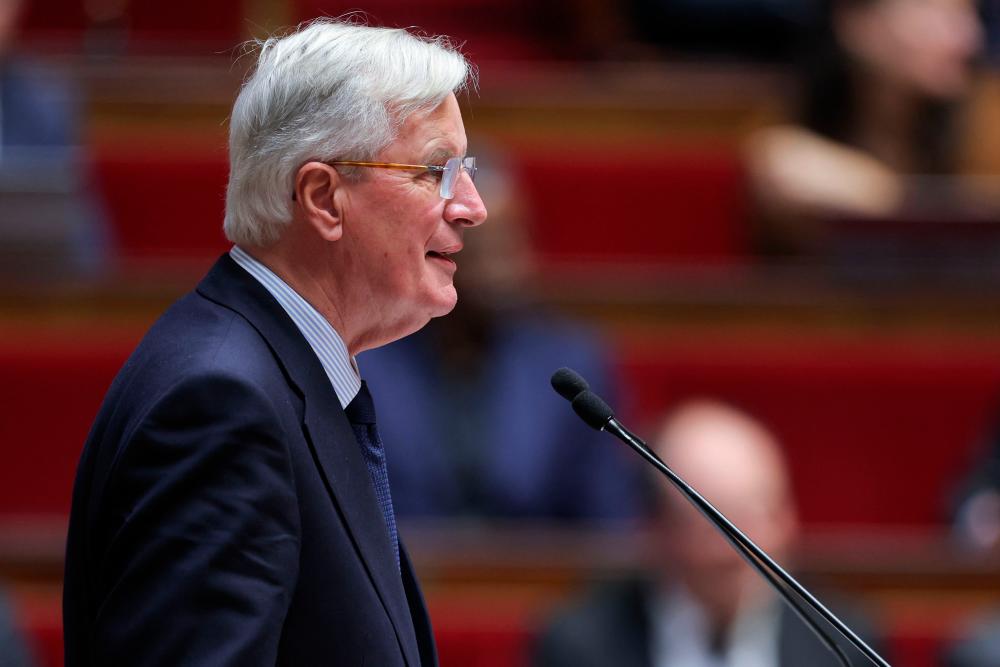PARIS: France’s new prime minister Michel Barnier on Tuesday survived a motion of no confidence brought by the left, a first test for his government whose support in parliament is fragile.
The motion, which would have needed 289 votes to be adopted by a majority of the 577-seat National Assembly, was supported by only 197 lawmakers.
The left-wing New Popular Front (NFP) coalition had put forward the motion with Socialist Party (PS) leader Olivier Faure defending it, but he admitted that it was soundly beaten.
“There was very little suspense,“ said Faure.
“Now, the French know who is in the majority and who is in the opposition,“ he admitted, while accusing Barnier of being a “hostage and accomplice of the extreme right” that will now “demand pledges from him”.
The motion failed because the far-right National Rally (RN) clearly voted against it.
With parliament roughly divided between three equal groupings of leftists, centrists and the far right, finding political consensus is a tough ask.
“It’s mathematical, without the support of the RN, your government would have been overthrown,“ said Cyrielle Chatelain, the head of the Ecologists party that like the Socialists forms part of the NFP.
She said the result showed there was “a political deal between (President) Emmanuel Macron and Marine Le Pen”, the leader of the RN and a three-time presidential candidate.
RN MP Guillaume Bigot accused the NFP, which is led by the far-left France Unbowed party, of “sulking” and insisted that to bring down the government could only “lead to chaos”.
- ‘Democratic hijack’ -
Barnier, a right-wing former European Union Brexit negotiator, was appointed by Macron in a bid to bring stability after inconclusive legislative elections in July.
The 73-year-old premier has since sought to firmly take the reins, cautioning that France faces a financial crisis if its budget deficit is not narrowed and warning of tax rises for high earners.
Macron, whose term runs until 2027, has in recent weeks noticeably taken a back seat, especially on domestic issues, while making uncharacteristically infrequent public comments.
The appointment of Barnier, a patrician figure from the Republicans (LR) traditional right who served stints as a minister and EU commissioner, has also been a contrast for the French.
They have seen three premiers who were almost unknown before their appointment come and go in four years.
But Barnier and his right-wing government could be toppled at any moment if a future no-confidence motion were passed in the lower house National Assembly.
The NFP coalition of socialists, communists, hard leftists and greens won the most seats of any group in the legislative polls in July but the RN emerged as the largest single party.
The NFP is still livid that Macron did not appoint a left winger as prime minister.
Before Tuesday’s vote, Faure accused the government of staging a “democratic hijack”, telling Barnier that his administration should “never have been appointed”.
- ‘Sword of Damocles’ -
Barnier had brushed off the motion, telling Faure he was aware of the Socialist’s intention to depose the government “before I even opened my mouth, formed my government or delivered a general policy statement”.
It was doomed to failure as Le Pen had already made clear that the RN would not back it.
Even Faure had already conceded that Barnier would remain “in control of the country at the end of this session”.
But commentators have noted that the fate of Barnier’s government risks being at the RN’s mercy, vulnerable to a “sword of Damocles” wielded by Le Pen, who is expected to run for the presidency in 2027.
The prime minister has shown he is aware of the risks ahead. “I know that I am in the hands of parliament,“ he told weekly La Tribune Dimanche.









